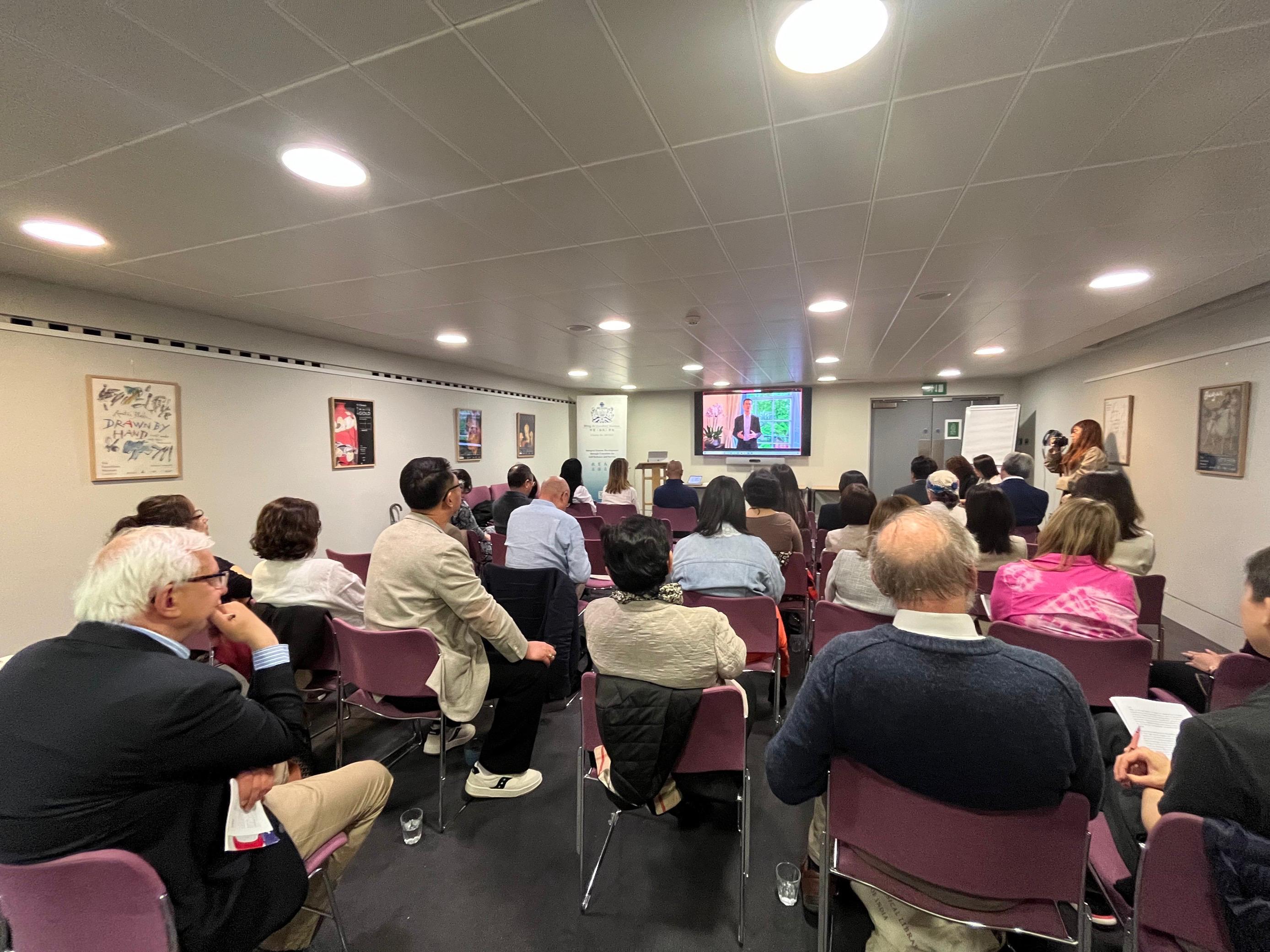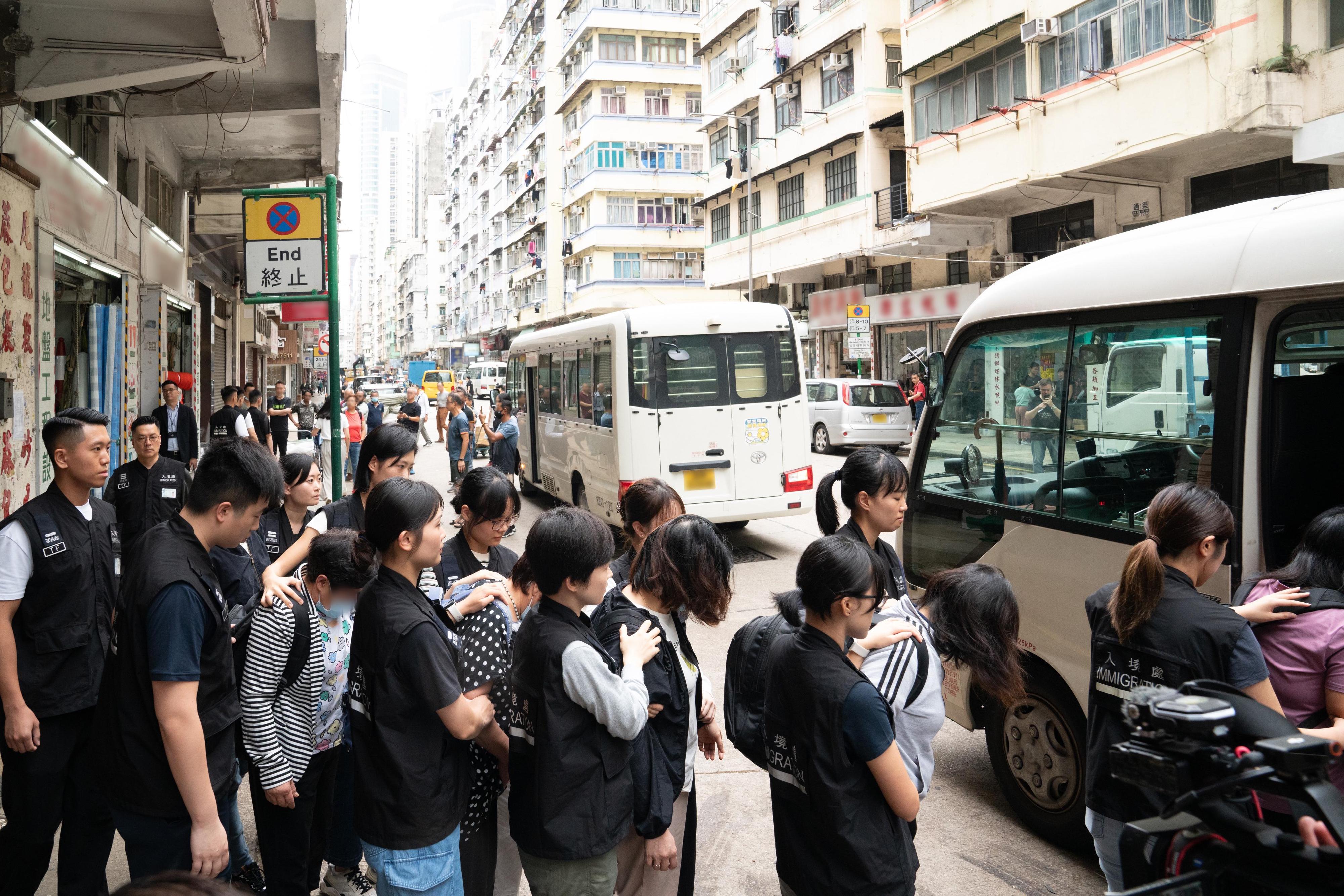Following is a question by Dr the Hon Lo Wai-kwok and a reply by the Acting Secretary for Security, Mr Michael Cheuk, in the Legislative Council today (May 22):
Question:
There are views pointing out that the fire broke out in an old composite building in Kowloon last month which resulted in multiple casualties has once again sounded an alarm for the potential fire safety hazards of old buildings. In this connection, will the Government inform this Council:
(1) whether it will immediately conduct large-scale fire safety risk assessments on the same type of buildings across the territory and allocate additional resources to step up routine inspections and improve the monitoring system, so as to plug the fire safety loopholes in such buildings; if so, of the details; if not, the reasons for that;
(2) as the authorities indicated in the reply to a question raised by a Member of this Council on the 24th of last month that the Fire Safety (Buildings) (Amendment) Bill would be submitted to this Council for scrutiny as soon as possible, and that the proposed legislative amendments include increasing the penalties for non-compliance with the relevant directions or orders, whether the authorities will, in response to the aspirations of society, undertake that the Bill will be submitted to this Council expeditiously within the current legislative session, and further increase the relevant penalties; if so, of the details; if not, the reasons for that; and
(3) as it is learnt that the number of old buildings in Hong Kong has been on the rise, with some of them even being plagued with problems, whether the authorities will advocate public-private partnership to step up efforts in redeveloping old districts, so as to eradicate the potential fire safety hazards of old buildings in the urban areas at root; if so, of the details; if not, the reasons for that?
Reply:
President,
Fire safety of buildings is a matter of great concern to the Government. A multi-pronged approach has been taken to improve the fire safety standards of buildings.
With regard to law enforcement, the Fire Services Department (FSD) handles fire hazards in buildings in accordance with the Fire Services Ordinance. It includes conducting inspections of buildings in respect of fire safety, on a regular basis or upon receiving complaints. If fire hazards are identified, including means of escape being obstructed or locked, smoke stop doors being left open or defective, or fire service installations or equipment (FSIs) are not in efficient working order or have not undergone annual inspection, etc, the FSD will follow up and take appropriate enforcement actions in accordance with the relevant regulations.
Moreover, in respect of legislation, to enhance the fire safety standard of old buildings, the Government enacted the Fire Safety (Buildings) Ordinance (Ordinance) which stipulates that composite and domestic buildings constructed in or before 1987 must be enhanced to meet modern fire safety standards. Being the enforcement authorities, the FSD and the Buildings Department (BD) have been conducting joint inspections of relevant buildings across the territory in a systematic manner, and in light of the actual condition of the buildings and in accordance with the requirements of the Ordinance, issue Fire Safety Directions (Directions) to the owners or occupiers, specifying the required fire safety improvement works. There are about 14 000 relevant buildings regulated under the Ordinance. To date, about 10 940 buildings have been inspected and over 370 000 Directions have been issued. About 40 per cent of them have been complied with or discharged, with the remaining some 60 per cent being followed-up on. I would like to stress that while the objective of the Ordinance is to enhance the fire safety standards of relevant buildings, it does not mean that these buildings are subject to imminent fire risks. In fact, these buildings were constructed in accordance with applicable fire safety and construction standards prevailing at the time when they were built.
With regard to the enforcement of the Ordinance, a relevant owner or occupier who fails to comply with the requirements of the Ordinance without a reasonable excuse is guilty of an offence, the FSD and the BD will take enforcement actions accordingly. Since the Ordinance has come into force, about 3 600 cases that failed to comply with the requirements of the Ordinance without reasonable excuse have been successfully prosecuted.
As for raising public awareness of fire safety, the FSD has been promoting fire safety to members of the public through public education and community engagement programmes. The FSD also co-ordinates with other government departments and District Fire Safety Committees, and organises various fire safety promotional activities, fire drills and fire safety talks, etc, to enhance the public’s knowledge of fire safety in a holistic manner.
With regard to the part on inspection and other aspects of the question raised by the Member, having consulted the Development Bureau (DEVB), my consolidated reply is as follows:
(1) With regard to fire safety inspections, apart from carrying out inspections and enforcement actions in response to public complaints against fire hazards, in order to reduce potential fire hazards in old buildings in a more effective and comprehensive manner, the FSD has implemented the Risk-based Building Fire Safety Visit Programme with priority given to buildings with relatively higher fire risk, such as those of a higher building age, lack of FSIs, with single-staircase design, as well as “three-nil” buildings, etc. Buildings with higher risk are subject to inspection once or twice a year. The purposes of the inspections are to identify potential fire hazards in the public areas inside buildings and to enable frontline FSD personnel to become more familiar with the features of these buildings so as to better prepare for firefighting and rescue work in future.
In response to the fire that broke out in New Lucky House earlier, the FSD has further strengthened its efforts and redeployed manpower to proactively conduct inspections and take appropriate enforcement actions against irregularities, such as means of escape being obstructed and defective FSIs, in accordance with relevant legislations. We will review the effectiveness of the relevant enforcement actions in a timely manner and, having regard to actual needs and circumstances as well as manpower arrangements, consider regularising relevant inspection work.
Over 9 000 enforcement actions were taken by the FSD in 2023, among which over 3 600 Fire Hazard Abatement Notices were issued and more than 300 prosecutions were instigated.
(2) To improve the existing legislative framework, the Government is expediting the work on amending the Fire Safety (Buildings) Ordinance to empower the FSD and the BD to carry out fire safety improvement works for the buildings for owners who have failed to comply with the requirements of the Ordinance (defaulted works), and to recover the relevant fees upon completion of the defaulted works. I would like to reiterate that timely and proper maintenance of private buildings is the responsibility of owners. We propose to amend the Ordinance and to arrange for defaulted works because we understand that some owners are facing genuine difficulties, and that empowering the Government to carry out defaulted works by way of amending the Ordinance can assist those owners with genuine difficulties in enhancing the fire safety standards of those relevant buildings, providing better protection to them.
There are views in the community that the deterrent effect of penalty should be kept abreast with the times. With reference to penalties for offences of a similar nature or gravity, we incline to raise the penalties for non-compliance with the Directions and Fire Safety Compliance Orders for four times, to $100,000 and $200,000 as maximum respectively, and to raise the corresponding fine for each day during which the offence continues, in the hope of increasing the deterrent effect.
The amendments to the Ordinance also include other different elements, such as introducing provisions against un-co-operative owners to prevent any person from intentionally obstructing an owners’ corporation in complying with the requirements of the Ordinance, empowering the Government to register relevant instructions of the Ordinance issued against the involved buildings or their relevant parts (which are yet to be complied with) in the Land Registry. It is envisaged that the aforementioned measures will effectively strengthen the deterrent effect and encourage owners to comply with the requirement of the Ordinance, with a view to enhancing the compliance rate.
The Government is stepping up its efforts in taking forward the relevant legislative amendment work and will strive to submit the proposed amendment bill to the Legislative Council for scrutiny in July.
(3) According to the DEVB, a sustainable urban renewal strategy is to adopt a dual-track approach of redevelopment and rehabilitation. On building rehabilitation, the Government adopts a multi-pronged approach. Apart from providing subsidies and technical assistance for owners to carry out building inspection and maintenance, the Government will also proactively intervene by carrying out emergency works on behalf of owners where necessary and step up its enforcement efforts.
For some old and dilapidated buildings, rehabilitation may not be cost-effective, and redevelopment is relatively practical and effective. The Government is facilitating and expediting redevelopment projects by the public and private sectors on various fronts. On the one hand, the Government supports the URA (Urban Renewal Authority) in taking forward redevelopment projects that will bring greater benefits to the residents. On the other hand, in order to encourage private developers to participate in redevelopment, the Government has introduced a number of policies and measures in recent years to enhance the financial viability of redevelopment projects, including the pilot scheme on transfer of plot ratio and the gradual permission of interchangeability between domestic and non-domestic plot ratios, etc, in Yau Ma Tei and Mong Kok. The URA is also conducting planning studies in Tsuen Wan and Sham Shui Po, and is expected to put forward urban renewal master plans and restructuring proposals for these two districts by phases from the second half of this year. In addition, the DEVB has introduced the Land (Compulsory Sale for Redevelopment) (Amendment) Bill 2023 into the Legislative Council to step up efforts to encourage larger-scale private redevelopment projects by lowering the compulsory sale thresholds and facilitating the redevelopment of adjoining lots, and will endeavour to co-operate with the scrutiny work of the relevant Bills Committee. The DEVB also commenced a study at the end of last year to explore specific measures to make use of new development land to help promote large-scale redevelopment projects in old districts by the public and private sectors, with the aim of making proposals in the first half of 2025.
It is the responsibility of owners to timely repair, properly maintain and effectively manage private buildings, including carrying out fire safety improvement works. Eliminating fire hazards, for example, by ensuring that means of escape are free from obstruction and by keeping smoke stop doors closed, should be everyone’s shared responsibility. While the Government adopts a multi-pronged approach to deal with fire safety of old buildings, we hope that all people will take an extra step and join hands to create a safe living environment.
Thank you, President. read more



